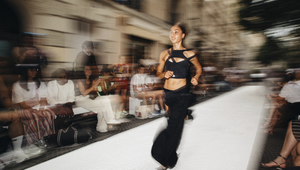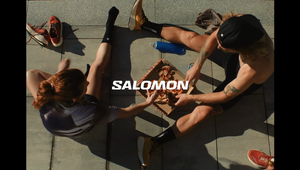
The Directors: Guillaume Allantaz

Guillaume Allantaz, film director, first started his career as a graphic designer and then as an art director in the watch making industry. Passionate about creating and working with imagery, it is only naturally that he started to transcribe his vision as film director working for documentaries and commercials all around the globe. He now has the opportunity to work on worldwide digital and TV campaigns for prestigious brands, feeding his desire to create powerful and emotional visual stories.
Name: Guillaume Allantaz
Location: France
Repped by/in: Soldats France
LBB> What elements of a script sets one apart from the other and what sort of scripts get you excited to shoot them?
Guillaume> I’m very sensitive to the visual look and references used in a script. It gives me a lot of information on the profile of people I would be collaborating with, and what they are expecting from me. I’m also very attached to the brand or institution I am working for. I usually work for brands that I like product wise, or which have a vision and values I can identify with.
LBB> How do you approach creating a treatment for a spot?
Guillaume> For me the treatment should reflect the film on the first read. It’s also a really important step of the pre-production process. A good treatment will help you win the film in the case of a competition and gives everyone involved in the making of the film, a good understanding of what you are trying to achieve.
I always work on the art direction and the design of my treatment myself. Having a graphic designer background and having been an art director for a couple of years, I’m a bit obsessed with how my treatment should look. From the font that I use down to the position by a pixel of each one of the pictures used. It also helps me a lot on how to approach the spot. I re-watch all the references that I dug up, re-think all the details. Working on my treatment gives me a clear view of the film and what I want or don’t want.
LBB> If the script is for a brand that you're not familiar with/ don’t have a big affinity with or a market you're new to, how important is it for you to do research and understand that strategic and contextual side of the ad? If it’s important to you, how do you do it?
Guillaume> It’s always important to grasp the context of an ad and in which ecosystem it’s going to take place. We work in advertisement, and you need to be efficient and think of how the final product will be seen.
On the strategic side, I think this is more of the agency’s job, to give the director good indications on what is expected and what the goal is. If they are looking for an out-of-the-box vision, you definitely need to avoid thinking too much of what their ads usually look like and work with your own style and approach for the spot. In opposition, if you are working for a product that needs to be treated with a specific angle, you’ll need to learn the codes to be sure to have the right look and feel. In these cases, I usually do a lot of research during the prep and try to work with people (DPs for example) that have the expertise that I’m looking for.
LBB> For you, what is the most important working relationship for a director to have with another person in making an ad? And why?
Guillaume> The producer is key for sure because they’re the one who’ll take the important decisions, and if they’re not putting the effort on the key aspects for the type of movie you want to make, it can be a disaster for the film. After that, I don’t want to seem too political, but I pay close attention to having a close relationship with everyone involved in the process. From the agency, to my DP, art department, grips 1st AD, editor, post producer, producer... We are all working in a such short period of time to create an ad that for me, good communication and giving the right information to everyone is key to achieve the vision I wrote in my treatment.
LBB> What type of work are you most passionate about - is there a particular genre or subject matter or style you are most drawn to?
Guillaume> I’m in love with visuals in general. And I love going from studio shoots to outdoor shoots or just working on a full post-production work. As long as I can play with different types of imagery, I’m happy.
LBB> What misconception about you or your work do you most often encounter and why is it wrong?
Guillaume> I don’t think I have experienced any specific misconception about myself or my work. I would say misconceptions are general towards a lot of professionals and not only in our industry. What I mean by this is that, in our area of work, everyone tends to get boxed-in to a style, a type of product or film category... I believe that even though I have my own style and aesthetics, I am capable of producing something completely different when needed to serve a purpose. Isn’t that what being a creative is all about actually?
LBB> Have you ever worked with a cost consultant and if so how have your experiences been?
Guillaume> No never directly, but I know how to deal with budget as I have produced a lot of my own films and most of the time, I’m in direct contact with the client. But I have never worked with a cost consultant.
LBB> What’s the craziest problem you’ve come across in the course of a production – and how did you solve it?
Guillaume> I think I am the kind of person who tries to avoid problems as much as possible, so I usually anticipate them or manage to work my way around them one way or another. Touch wood, for the moment, I have never had any major issues during a film project. So, I try to take a step back from some situations when stress gets high because let’s be honest, we’re not saving lives here!
My only concern when working in sports and the outdoor industry, and being obsessed by getting the shot, is that we sometimes take unconsidered risks that could cost us or even put the crew’s lives in danger sometimes. I can’t count how many times we took inconsiderable risk to capture a shot when I was shooting in the mountains, or on some non-closed road, or following at high speed at the back of a car or a motorbike….
LBB> How do you strike the balance between being open/collaborative with the agency and brand client while also protecting the idea?
Guillaume> I always try to keep a good open relationship with the agency to exchange ideas when it’s possible. I also pay a lot of attention to client feedback in pre-production to be able to anticipate comments or requests on the shoot or in post. This can also help avoid some problems if all points are mentioned before the shoot. Then, I try to keep my vision or fight for it as long as I can if some major modification arises, but it’s rarely the case. After they all agree on the treatment, we are usually in line with what’s going to happen.
LBB> What are your thoughts on opening up the production world to a more diverse pool of talent? Are you open to mentoring and apprenticeships on set?
Guillaume> I quite regularly take on young talents to work with me. And to be honest, seeing the emergence of videos on social media, I don’t think we will need to mentor too much! The new generation is self-learning and is experimenting so much with social media that we are seeing a whole new panel of creatives with very different & strong DNA, with powerful skills on how to create visuals. So, I think going forward, the production companies will be the ones learning from the new generation, not the other way around. Having said that, managing agency and client relationship is where us more experienced directors might have something to teach.
LBB> How do you feel the pandemic is going to influence the way you work into the longer term? Have you picked up new habits that you feel will stick around for a long time?
Guillaume> I think for me (working in the ad industry, or content creation) the pandemic made the business grow. People where definitely more in front of their screens and the need for content grew at the same time. With a different scale in budget for sure but more work definitely came from it. As of new habits, not really. Having my own studio, I continued going there every day to work during the pandemic. I needed that space to be focused and that is still the case.
LBB> Your work is now presented in so many different formats - to what extent do you keep each in mind while you're working (and, equally, to what degree is it possible to do so)?
Guillaume> I think we have a thing nowadays with the number of deliveries for a project. It’s a completely different way of creating a spot depending on how it will be broadcasted. And too often we are trying to make a good film that fits all because it’s easier, cheaper etc… but I think it’s a mistake and we need to have the time to work properly on each delivery even if that means that we have a bit less budget for the “main” 16:9 film. We sometimes put so much effort and budget on a 16:9 film which will end up cropped badly for all the rest of the deliveries. And these are the ones which will be seen ten times more than the 16:9. I think agencies need to stop selling them as “just extra cuts” to put on Insta. They need to be different to fit the media. Which means that we need to think each format and put the time and effort into each one.
LBB> What’s your relationship with new technology and, if at all, how do you incorporate future-facing tech into your work (e.g. virtual production, interactive storytelling, AI/data-driven visuals etc)?
Guillaume> I love all new technology to create imagery. This is not obvious in my work but I love to keep an eye on what is coming and how it works. I was lucky to meet in their very beginnings, APPIA, a virtual studio, who have now become good friends. They gave me the opportunity to work and experiment with their tool to create a personal project. And I loved it. I love to mix high tech with more physical techniques. And virtual production is a good example for that, I think. As for AI, I’m just starting to experiment with it and I’m amazed with the possibilities it gives… and it freaks me out a little at the same time, haha!
LBB> Which pieces of work do you feel really show off what you do best – and why?
Guillaume> Arfff this is always a hard question for me. I’m always more excited about what’s coming than about what I’ve done, so I would say that my best work will be the next one ;)















